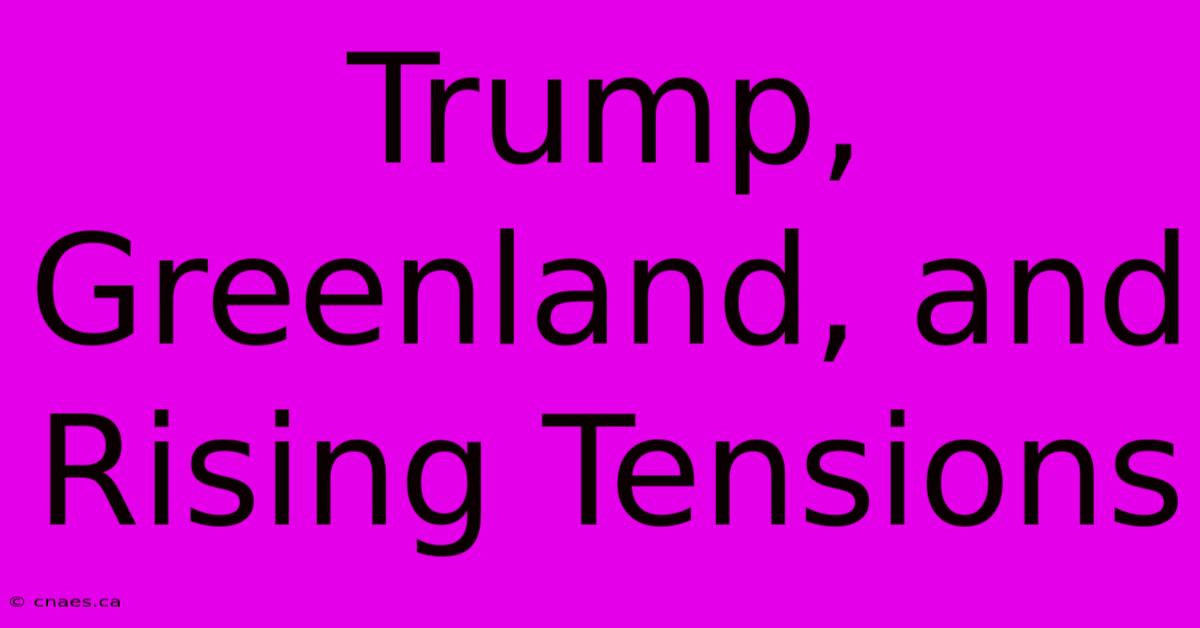Trump, Greenland, And Rising Tensions

Discover more detailed and exciting information on our website. Click the link below to start your adventure: Visit My Website. Don't miss out!
Table of Contents
Trump, Greenland, and Rising Tensions: A Look Back at a Tumultuous Chapter
The proposed purchase of Greenland by the United States, a notion floated by then-President Donald Trump in 2019, ignited a firestorm of international controversy and exposed underlying tensions between the US and Denmark, Greenland's governing power. This episode wasn't just a quirky news item; it revealed deeper geopolitical currents and anxieties surrounding resource acquisition, climate change, and great power competition in the Arctic.
The Genesis of the Idea: Strategic Interests and Resource Potential
Trump's interest in Greenland stemmed from a confluence of factors. The Arctic region is increasingly strategic due to its melting ice caps, opening up new shipping routes and access to potentially vast mineral resources. Greenland, the world's largest island, possesses significant reserves of rare earth minerals, crucial for modern technology, as well as oil and natural gas. Acquiring Greenland, in Trump's view, would enhance U.S. strategic influence in the region and secure access to these valuable resources.
A Controversial Proposal: Reactions from Denmark and Greenland
The proposal, however, was met with swift and firm rejection from both Denmark and Greenland. Danish Prime Minister Mette Frederiksen described the idea as "absurd," underscoring Greenland's status as a self-governing territory within the Kingdom of Denmark, but not for sale. Greenland's leaders echoed this sentiment, highlighting their commitment to self-determination and emphasizing their desire to maintain their sovereignty.
Beyond the Headlines: Geopolitical Implications
The episode transcended a simple real estate deal. It underscored the growing competition for influence in the Arctic among major global powers, including the United States, Russia, and China. Each nation seeks to secure access to the region's resources and strategic advantages. Trump's overt attempt to acquire Greenland highlighted the intensifying geopolitical stakes in the Arctic and the potential for conflict over resources and territory.
Climate Change and Arctic Meltdown
The melting Arctic ice caps are a key factor driving the increased interest in the region. The opening of new shipping routes and access to previously inaccessible resources has dramatically altered the geopolitical landscape. This, in turn, increases the pressure on Greenland, its resources, and its relationship with its sovereign nation, Denmark. Climate change significantly contributes to these rising tensions.
The Aftermath and Lingering Tensions
Despite the rejection of the purchase proposal, the episode left a mark on US-Danish relations. The abrupt and seemingly informal manner in which the proposal was launched caused significant friction. It highlighted the potential for miscommunication and misunderstanding between allies, particularly concerning sensitive geopolitical matters. The incident served as a reminder of the complexities of international relations and the need for careful diplomatic engagement.
Conclusion: A Case Study in Arctic Geopolitics
The Greenland saga, though ultimately unsuccessful, offers a valuable case study in Arctic geopolitics. It underscored the growing competition for resources and influence in the region, the implications of climate change, and the importance of respecting national sovereignty and self-determination. The episode serves as a potent reminder of the ever-evolving power dynamics in the Arctic and the potential for future conflicts driven by resource scarcity and strategic interests. The episode's legacy remains in the ongoing debate about the future of the Arctic and the challenges of balancing national interests with international cooperation.

Thank you for visiting our website wich cover about Trump, Greenland, And Rising Tensions. We hope the information provided has been useful to you. Feel free to contact us if you have any questions or need further assistance. See you next time and dont miss to bookmark.
Also read the following articles
| Article Title | Date |
|---|---|
| India Womens Cricket Victory | Dec 24, 2024 |
| Fatal Fire Migrant Indicted | Dec 24, 2024 |
| Ground Stop American Airlines | Dec 24, 2024 |
| Squid Game Red Light Explained | Dec 24, 2024 |
| Damon And Hollands Nolan Collaboration | Dec 24, 2024 |
